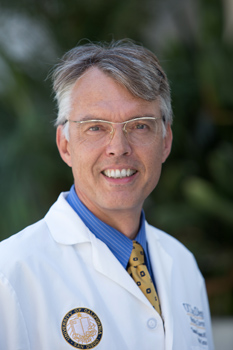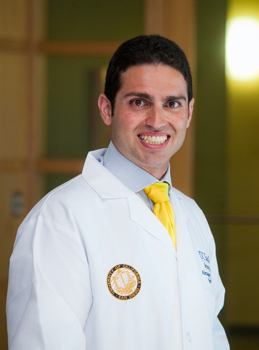UC San Diego Health Receives Certification for Second Comprehensive Stroke Center
When every minute counts, stroke patients can now receive highest quality of care in La Jolla and Hillcrest
By:
- Gabrielle Johnston, MPH
Published Date
By:
- Gabrielle Johnston, MPH
Share This:
Article Content
A patient loses 1.2 million neurons each minute during a stroke, so time is of the essence to receive the highest level of care. Jacobs Medical Center at UC San Diego Health in La Jolla recently received certification from the Joint Commission to be a Comprehensive Stroke Center. This certification is in addition to the existing accreditation at UC San Diego Medical Center in Hillcrest. This expansion makes UC San Diego Health the only health system in San Diego County to have two access points for comprehensive stroke care.

Thomas Hemmen, MD, PhD, director of stroke neurology at UC San Diego Health and associate professor of neurosciences at UC San Diego School of Medicine.
“Where you get your stroke care matters more so than almost any other medical condition,” said Thomas Hemmen, MD, PhD, director of stroke neurology at UC San Diego Health and associate professor of neurosciences at UC San Diego School of Medicine. “Care at a Comprehensive Stroke Center means advanced treatment options and not having to be transferred to other facilities when a more complex intervention is needed, ensuring a continuity of care without wasting valuable time.”
Jacobs Medical Center’s stroke care facilities include a state-of-the-art neurological intensive care unit, an endovascular suite for minimally invasive therapies and inter-operative suites with image guidance technology, which means all imaging can be reviewed in real time right in the operating room, making the process more efficient and time sensitive.
“We use highly advanced diagnostic and treatment technologies to provide tailored care for each individual patient,” said Alexander Khalessi, MD, acting clinical chief of neurosurgery and director of neurovascular surgery in the Department of Neurosurgery at UC San Diego Health.
The Comprehensive Stroke Center certification is awarded by The Joint Commission and is a voluntary process that distinguishes UC San Diego Health as having top tier physicians, significant resources in infrastructure, dedicated staff and the training necessary to provide state-of-the-art, complex stroke care. The designation is also based on neurosurgical outcomes. UC San Diego Health was found to have a high volume of stroke cases with low complications and optimal outcomes.
In 2012, UC San Diego Medical Center received its first designation as a Comprehensive Stroke Center. At the time, it was one of the first five facilities in the nation to receive this designation, and the only one in San Diego Country. There are now 130 Comprehensive Stroke Centers in the nation.
A stroke occurs when blood flow to an area of the brain is disrupted. This can happen either by a blood clot (ischemic) or bleeding in the brain caused by an aneurysm or leaking blood vessel (hemorrhagic). When blood flow is cut off from the brain, cells begin to die from a lack of oxygen, which could potentially damage the affected area.
UC San Diego Health has a multi-disciplinary team of stroke experts, including neurologists, neurosurgeons, endovascular surgeons and cardiologists who use leading-edge approaches and image-guided devices to restore blood flow of major brain arteries in the most severe stroke cases.
The team of experts has been on the forefront of stroke care by leading clinical trials, developing innovative devices at the Center for the Future of Surgery at UC San Diego School of Medicine and working with the American Heart Association/American Stroke Association to write new guidelines for the early management of stroke patients.

Alexander Khalessi, MD, acting clinical chief of neurosurgery and director of neurovascular surgery in the Department of Neurosurgery at UC San Diego Health.
“We are truly shaping the future of stroke care,” said Khalessi.
Every year, more than 5,000 San Diegans arrive to a hospital with an acute and sometimes fatal stroke. In 2016, stroke was the fifth leading cause of death in the United States, with 795,000 Americans experiencing some form of stroke, according to the Centers for Disease Control and Prevention.
“During an acute event, a stroke patient doesn’t always get to choose where they go to receive care, but there can be a broad range of elective procedures that are needed after a stroke,” said Khalessi. “Patients need to understand their condition and where to get the necessary care for the best possible recovery and quality of life.”
“Meeting the high standards of The Joint Commission and having two Comprehensive Stroke Centers at UC San Diego Health speaks to the depth of our expertise, dedication and commitment to the community we serve,” said Hemmen.
To learn more about the Comprehensive Stroke Centers at UC San Diego Health, please visit health.ucsd.edu/stroke
Share This:
You May Also Like
Stay in the Know
Keep up with all the latest from UC San Diego. Subscribe to the newsletter today.



